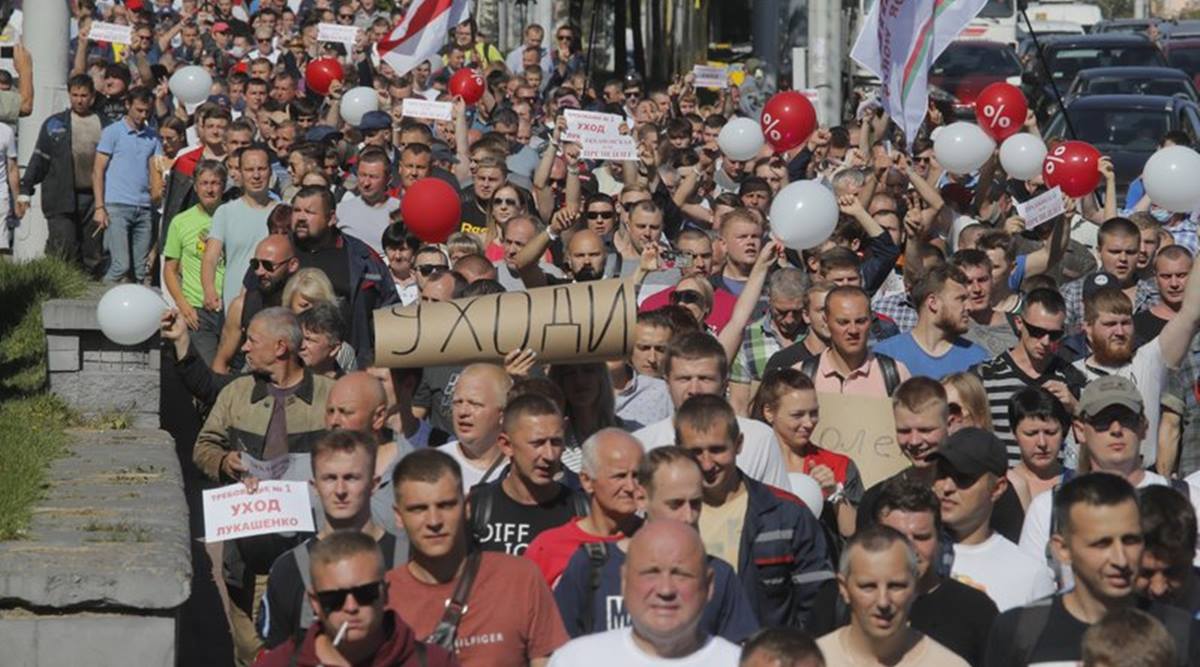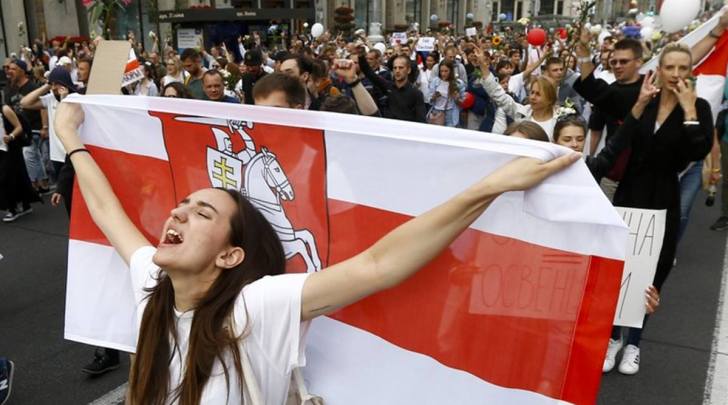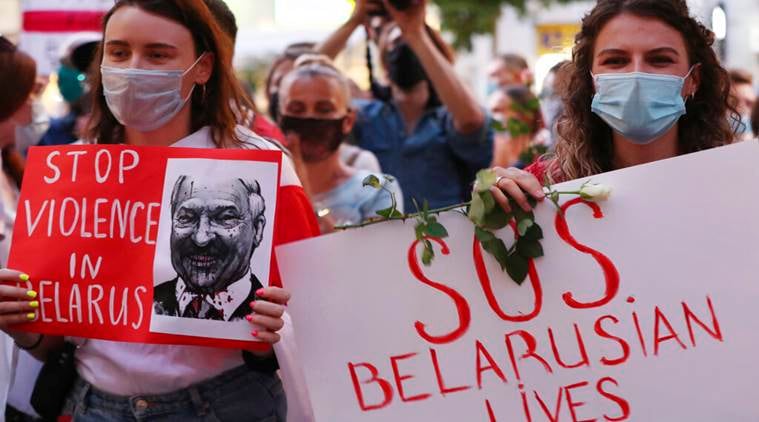 Belarus, a Russian ally, has been witnessing massive protests against President Lukashenko's regime with the country being divided between people vouching for pro and anti Russian sentiment. (Photo: AP)
Belarus, a Russian ally, has been witnessing massive protests against President Lukashenko's regime with the country being divided between people vouching for pro and anti Russian sentiment. (Photo: AP) As the anti-government protests enter its tenth day in Belarus, President Alexander Lukashenko Tuesday accused the opposition of trying to seize power while the European Union leaders, including French President Emmanuel Macron, urged Russian President Vladimir Putin to promote dialogue in the crisis-ridden country.
Belarus, a Russian ally, has been witnessing massive protests against President Lukashenko’s regime after election results handed him his sixth term with 80 per cent of the votes while his top challenger Sviatlana Tsikhanouskaya apparently only received 10 per cent.
The opposition denounced the vote as rigged and hundreds of thousands of people poured onto the streets across Belarus in protests.
Here are the top developments from Belarus:

EU leaders urge Russian President Putin to promote dialogue
European leaders urged Russian President Vladimir Putin to encourage talks between the conflicting sides in Belarus. Later, German Chancellor Angela Merkel spoke to Putin about the ongoing issue in Minsk.
AFP reported that Merkel told Putin the authorities in Minsk must “enter into a national dialogue with the opposition and society to overcome the crisis”, while Macron urged the Russian leader to foster “calm and dialogue”.
 Belarus protests: Factory workers in the Eastern European nation continued to strike on Tuesday, turning up pressure on the country’s authoritarian leader to step down after winning an election they allege was rigged.
Belarus protests: Factory workers in the Eastern European nation continued to strike on Tuesday, turning up pressure on the country’s authoritarian leader to step down after winning an election they allege was rigged.
EU chief Charles Michel said on Twitter that he had spoken to Putin by phone and added that “only peaceful and truly inclusive dialogue can resolve the crisis in Belarus”.
Lithuanian lawmakers vote for sanctions against Belarus
Lithuania’s parliament overwhelmingly voted for economic sanctions against the regime in neighboring Belarus, saying the presidential election there mustn’t be internationally recognised.
“We are sending a strong message to the world today,” Foreign Minister Linas Linkevicius said after the 120-0 vote with two abstentions. Nineteen of the Seimas assembly’s 141 members were absent. The document adopted by lawmakers also calls for the international rejection of the legitimacy of Belarus President.
Strikes demanding President to resign continue
 People demonstrate in support of Belarusians after a troubled weekend presidential vote, in Warsaw, Poland, Thursday, Aug. 13, 2020. (AP Photo/Czarek Sokolowski)
People demonstrate in support of Belarusians after a troubled weekend presidential vote, in Warsaw, Poland, Thursday, Aug. 13, 2020. (AP Photo/Czarek Sokolowski)
Factory workers in the Eastern European nation continued to strike on Tuesday, turning up pressure on the country’s authoritarian leader to step down after winning an election they allege was rigged.
More state-controlled companies and factories on Tuesday joined the strike that began the day before and encompassed several major tractor factories in Minsk, a huge potash factory in Soligorsk that accounts for a fifth of the world’s potash fertiliser output and is the nation’s top cash earner, state television and the country’s most prominent theater.
Belarusian ambassador resigns after supporting protesters
The Belarusian ambassador to Slovakia, who supported protesters rallying against his country’s authoritarian president, said on Tuesday that he has handed in his resignation, a move indicating growing dissent at a high level of government.
Igor Leshchenya said in an interview that it was “a logical move” after he recorded a video statement supporting unprecedented protests that have roiled Belarus for nine days in a row since the August 9 presidential election that gave a sixth term to longtime leader Alexander Lukashenko.
In the statement released on Saturday, Leshchenya expressed “solidarity with those who came out on the streets of Belarusian cities with peaceful marches so that their voice could be heard,” said he was shocked by the reports of mass beatings and torture of protesters and accused Belarusian law enforcement of restoring the traditions of the Soviet secret police.
“As an ambassador, I’m appointed by the president, and it is expected that I follow the policies determined by him. The Foreign Ministry (of Belarus) believes my civic stance has gone beyond that,” Leshchenya told independent Belarusian news outlet Tut.by on Tuesday.
(With inputs from AP, AFP, Agencies)